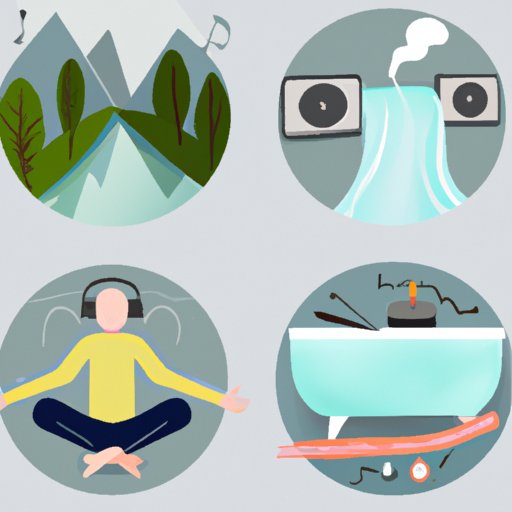Introduction
Stress and anxiety can have a major impact on our lives. It can affect our physical health, mental well-being, relationships, and even our work performance. Fortunately, there are many ways to relax and reduce stress. From mindful breathing to spending time in nature, here are 8 simple ways to become more relaxed.
Practicing Mindful Breathing
Mindful breathing is a relaxation technique that involves focusing on the breath and allowing it to slow and deepen naturally. Research has found that mindful breathing can reduce stress and anxiety, improve mood, and increase focus and concentration.
Benefits of Mindful Breathing
- Reduces stress and anxiety
- Improves mood
- Increases focus and concentration
Steps for Practicing Mindful Breathing
- Find a comfortable place to sit.
- Close your eyes and focus on your breath.
- Breathe deeply and slowly.
- Focus on the feeling of your breath entering and leaving your body.
- Allow your breath to slow and deepen naturally.
- If your mind wanders, simply refocus your attention on your breath.
Taking a Warm Bath
Taking a warm bath is another great way to relax and reduce stress. Research has found that taking a warm bath can reduce muscle tension, improve mood, and reduce levels of cortisol (the “stress hormone”).
Benefits of Taking a Warm Bath
- Reduces muscle tension
- Improves mood
- Reduces levels of cortisol
Steps for Taking a Warm Bath
- Fill the bathtub with warm water.
- Add a few drops of essential oils, if desired.
- Soak in the tub for at least 20 minutes.
- Allow yourself to relax and enjoy the warmth of the water.
- When finished, take a few deep breaths before exiting the tub.
Getting Enough Sleep
Lack of sleep can lead to increased stress and anxiety. On the other hand, getting enough sleep can help us feel more relaxed and reduce levels of stress hormones. According to the National Sleep Foundation, adults need 7-9 hours of sleep per night.
Benefits of Getting Enough Sleep
- Reduces stress and anxiety
- Improves mood
- Increases alertness and cognitive performance
Strategies for Increasing Sleep Quality
- Avoid screens (phones, computers, TVs) at least one hour before bedtime.
- Keep your bedroom cool, dark, and quiet.
- Establish a consistent sleep schedule.
- Exercise regularly but avoid exercising close to bedtime.
- Limit caffeine and alcohol consumption.
- Try relaxation techniques such as deep breathing or progressive muscle relaxation.
Doing Yoga or Stretching
Yoga and stretching can be great relaxation techniques. Research has found that yoga can reduce stress and anxiety, improve mood, and increase mindfulness.
Benefits of Doing Yoga or Stretching
- Reduces stress and anxiety
- Improves mood
- Increases mindfulness
Tips for Doing Yoga or Stretching
- Find a quiet, comfortable place to practice.
- Start with basic poses and gradually increase difficulty.
- Focus on your breathing and move slowly and intentionally.
- Be gentle with yourself and don’t push too hard.
- Listen to your body and stop if you experience any pain.
Listening to Calming Music
Listening to calming music is another great way to relax and reduce stress. Research has found that listening to calming music can reduce stress and anxiety, improve mood, and increase overall wellbeing.
Benefits of Listening to Calming Music
- Reduces stress and anxiety
- Improves mood
- Increases overall wellbeing
Tips for Finding and Enjoying Calming Music
- Explore different genres and find what works for you.
- Create a calming playlist.
- Focus on the music and allow yourself to relax.
- Allow the music to take you away from your worries.
- Listen with headphones for the best effect.
Spending Time in Nature
Spending time in nature is an excellent way to relax and reduce stress. Research has found that spending time in nature can reduce stress and anxiety, improve mood, and increase happiness and overall life satisfaction.
Benefits of Spending Time in Nature
- Reduces stress and anxiety
- Improves mood
- Increases happiness and overall life satisfaction
Tips for Enjoying Nature
- Take a walk in a park or other natural area.
- Go for a hike in the woods.
- Visit a beach or lake.
- Go camping or spend a night under the stars.
- Observe wildlife in its natural habitat.
- Garden or spend time in your own backyard.
Conclusion
Relaxation is essential for managing stress and anxiety. There are many ways to relax, from mindful breathing to spending time in nature. By incorporating these techniques into your daily routine, you can reduce stress, improve your mood, and increase overall wellbeing.
(Note: Is this article not meeting your expectations? Do you have knowledge or insights to share? Unlock new opportunities and expand your reach by joining our authors team. Click Registration to join us and share your expertise with our readers.)
